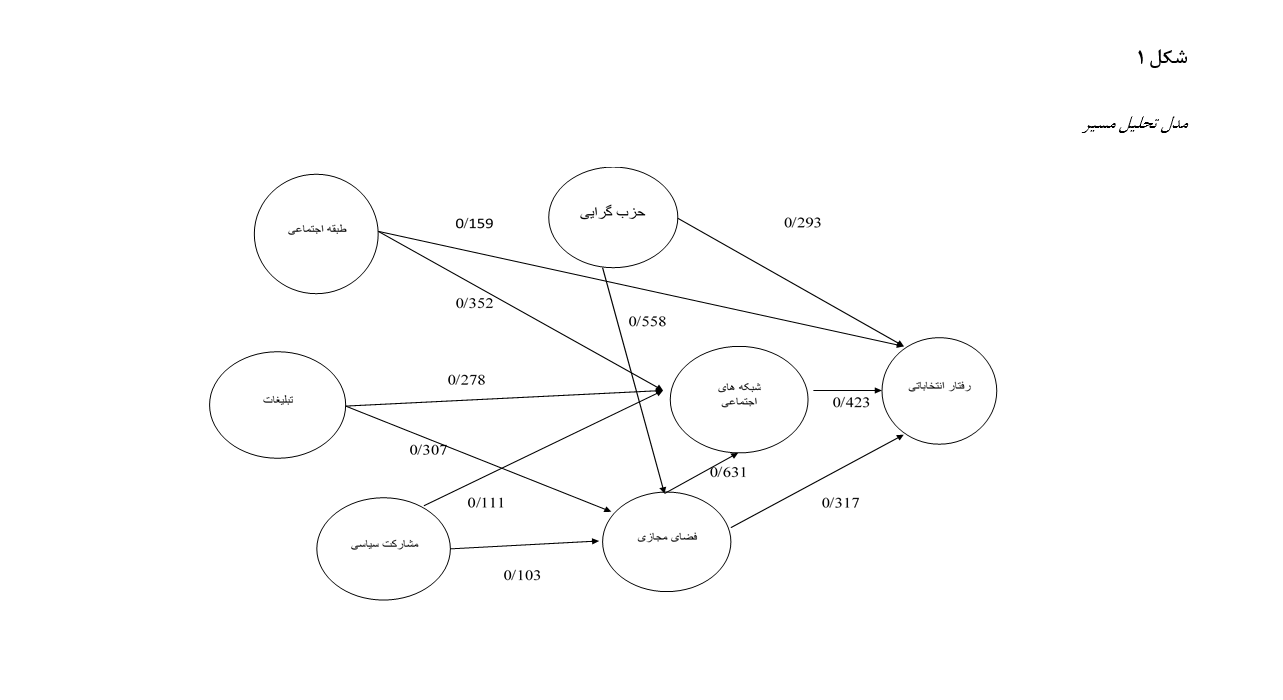تاثیر شبکههای اجتماعی و فضای مجازی بر رفتار انتخاباتی شهروندان با تأکید بر مشارکت سیاسی درانتخابات ریاست جمهوری سیزدهم (درحوزه انتخابیه شهرستانهای قصرشیرین، سرپل ذهاب، گیلانغرب)
کلمات کلیدی:
شبکه های اجتماعی, مشارکت سیاسی, رفتار انتخاباتی, دوره سیزدهم ریاست جمهوریچکیده
هدف اصلی این تحقیق بررسی میزان تأثیر شبکههای اجتماعی بر رفتار انتخاباتی شهروندان با تأکید بر مشارکت سیاسی درانتخابات ریاست جمهوری سیزدهم،حوزه انتخابیه (قصرشیرین، سرپل ذهاب و گیلانغرب) در استان کرمانشاه قرار گرفته است. روش تحقیق: تحقیق به روش پیمایش و با استفاده از ابزار پرسشنامه محقق ساخته انجام گرفت. جامعه آماری تحقیق شهروندان بالای ۱۸ سال حوزه انتخابیه قصرشیرین بود که در انتخابات ریاست جمهوری سال ۱۴۰۰ شرکت کرده بودند و روش نمونهگیری، نمونه گیری خوشهای چند مرحلهای بود. حجم نمونه با استفاده از فرمول کوکران ۳۷۸ نفر تعیین شد. دادهها در دو بخش توصیفی و استنباطی با استفاده از نرم افزار spss مورد تحلیل و تحلیل قرار گرفتند.یافتههای تحقیق نشان میدهد که: بین متغیرهای زمینهای تحصیلات، طبقه اجتماعی، گرایش سیاسی با رفتار انتخاباتی رابطه معنیداری وجود داشت. همچنین بین متغیرهای مستقل اصلی تحقیق (مشارکت سیاسی و شبکه اجتماعی) با رفتار انتخاباتی رابطه معنیداری وجود داشت. یافتههای تحلیل مسیر که تاثیر مستقیم و میانجی را میسنجد نیز حاکی از آن است که که متغیر مشارکت سیاسی بیشترین تاثیر ۸۲/۰ درصد بیشترین تاثیر بر رفتار انتخاباتی داشتهاند. همچنین میزان ضریب تعیین ۷۲/۰ درصد میباشد که نشان میدهد ۷۲/درصد تغییرات متغیر وابسته (رفتار انتخاباتی) توسط متغیرهای مستقل (شبکه اجتماعی، مشارکت سیاسی) تبیین شده است.
دانلودها
مراجع
Alhoyrdi Zadeh, R., Naeiji, M., & Enayati Shabkalai, A. (2020). Determining the electoral behavior of ethnic groups in the eleventh presidential election of Iran (case study: Baluch and Turkmen ethnic groups). Quarterly Journal of Communication Research, 26(3), 185-205.
Barabasi, A. L. (2010). Bursts: The hidden pattern behind everything we do. New York: Dutton Books.
Christakis, N., & Fowler, J. (2009). Connected: The surprising power of social networks and how they shape our lives. Boston: Little, Brown and Company.
Dehghani, H. (2019). Explaining the electoral behavior of citizens in Isfahan with an emphasis on the Columbia and Michigan models: A case study. Scientific Quarterly of Strategic Studies in Public Policy, 9(33), 170-191.
Downs, A. (1957). An Economic Theory of Democracy. New York: Harper Row.
Erisen, E., & Erisen, C. (2008). A report on the social network battery in the 2006 ANES pilot study.
Fallahi, A. (2011). Investigating the tendency of social classes towards democracy Faculty of Law and Social Sciences, University of Tabriz].
Harary, F. (1969). Graph Theory. Reading, MA: Addison-Wesley. https://doi.org/10.21236/AD0705364
Hoepers, B. (2020). Government Advertising, Political Behavior, and Electoral Effects in Brazil.
Huckfeldt, R., & Sprague, J. (1995). Citizens, politics, and social communication. New York: Cambridge University Press. https://doi.org/10.1017/CBO9780511664113
Jih-Hsuan, L. (2016). Differential gains in SNSs: effects of active vs. passive Facebook political participation on offline political participation and voting behavior among first-time and experienced voters. Asian Journal of Communication, 26(3), 278-297. https://doi.org/10.1080/01292986.2016.1148184
Karimi Malah, A., & Tabarsoteh, M. S. (2019). Political sociology of electoral behavior in Kurdistan Province (from the first to the twelfth presidential elections). Sociology of Social Issues in Iran(7), 130-150.
Kasenally, R., & Awatar, D. (2017). Social Media, Elections and Political Engagement: The 2014 General Election in Mauritius. Journal of African Elections, 16(2), 47-70. https://doi.org/https://doi.org/10.20940/JAE/2017/v16i2a3
Lee, S., Nanz, A., & Heiss, R. (2022). Platform dependent effects of incidental exposure to political news on political knowledge and political participation. Computers in human Behavior, 127, 107048. https://doi.org/https://doi.org/10.1016/j.chb.2021.107048
Mousavi, S. Y., Ghorbanpour Ganjii, S. Y., & Mahdavi, M. S. (2019). Social factors affecting electoral behavior: The case of the presidential election in Mazandaran Province. Quarterly Journal of Social-Cultural Development Studies, 8(1), 187-215.
Munir, S. (2018). Social Media and Shaping Voting Behavior of Youth: The Scottish Referendum 2014 Case. The Journal of Social Media in Society, 7(1), 253-279.
Ohme, J. (2019). When digital natives enter the electorate: Political social media use among first-time voters and its effects on campaign participation. Journal of Information Technology & Politics, 3-18. https://doi.org/https://doi.org/10.1080/19331681.2019.1613279
Sharmaa, B. K., & Parma, S. (2016). Impact of Social Media on Voter's Behaviour-a Descriptive Study of Gwalior, Madhya Pradesh. International Journal of Research in Computer Science and Management, 4(1), 5-8.








